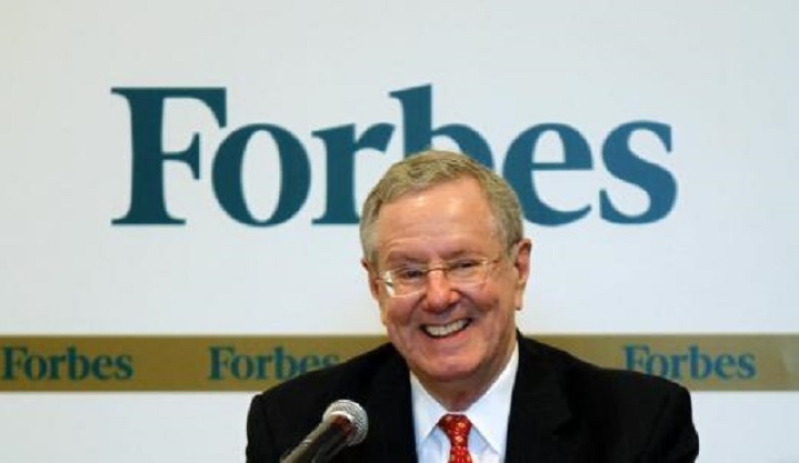
Steve Forbes, chairman and editor-in-chief of Forbes Media, spoke at Liberty University on Dec. 7 and emphasized the importance of adapting to change and embracing capitalism.
Forbes was introduced by University President Jerry Falwell before the Convocation, a weekly gathering of the school body and staff "to inform, inspire and sometimes to simply entertain." More than 13,000 people attend the assembly, with thousands more watching on television and online.
"We're so honored to have with us the chairman and editor-in-chief of Forbes magazine--four-time Crystal Owl Award winner, the prize given to financial journalists whose economic forecasts for the coming year prove to be the most accurate," Falwell said.
Falwell said Forbes also spoke at the university in 1996 and 2000 while he was campaigning "vigorously" for Republican presidential candidates.
Forbes addressed the assembly and talked about how important it is to see ahead and innovate a business based on projected future trends. He recounted how they decided to start an online version of the magazine, Forbes.com, in the mid-1990s that is a separate entity from the print publishing.
The Forbes.com team was housed in a different building, and Forbes gave a brilliant reason for doing this.
"We knew that if we put this new thing with the print operation, it would never be allowed to flourish-not out of malice, but just because you're accustomed to doing things in a certain way," he said. "So I put Forbes.com in a separate building, separate staff, separate reporting system--and the thing grew."
He said one guiding principle that led him to decide to "fundamentally change the way we do business" was what Peter Drucker, whom he referred to as "the late great management guru," said: "Every organization, including businesses, should always remind themselves: what is your purpose? What is your mission? What is it you were trying to do?"
Answering these questions led the company to where it is now, Forbes said.
"If you remind yourself what is it you were trying to do, especially in the business world where things are changing so rapidly, if you remind yourself of what your goal is, then you don't get quite as upset or disoriented when the means or the tools to achieve that goal change," he said.
Today, Forbes.com has more than 1,800 contracted expert contributors for Forbes.com, and the site boasts of 90 million unique visitors every month.
Forbes also emphasized the importance of entrepreneurial capitalism. He said his grandfather, the company's founder, believed in entrepreneurial capitalism and would always say that "the purpose of business is to produce happiness, not to pile up money."
Forbes had earlier complimented Liberty University for being an entrepreneurial university and for being "ahead of the pack."
He then proceeded to discuss the benefits of capitalism, saying it lays down the best economic environment for cooperation, creativity, trust and abundance. Capitalism, he said, is simply about identifying needs and meeting them.
Capitalism opens the way for people, including the working class, to have access to goods instead of just the rich benefitting from them. This is evident in what companies like Apple and Ford have done, making computers and automobiles accessible to everyone, he explained.
"Remember this: Capitalism, free markets, is about creating resources," Forbes said. "And when you create resources you can share resources, you can give away resources, and improve the quality of life, not only for yourselves but for the whole world."
He challenged the assembly to stay creative and innovative and to use their freedom for the sake of others.






